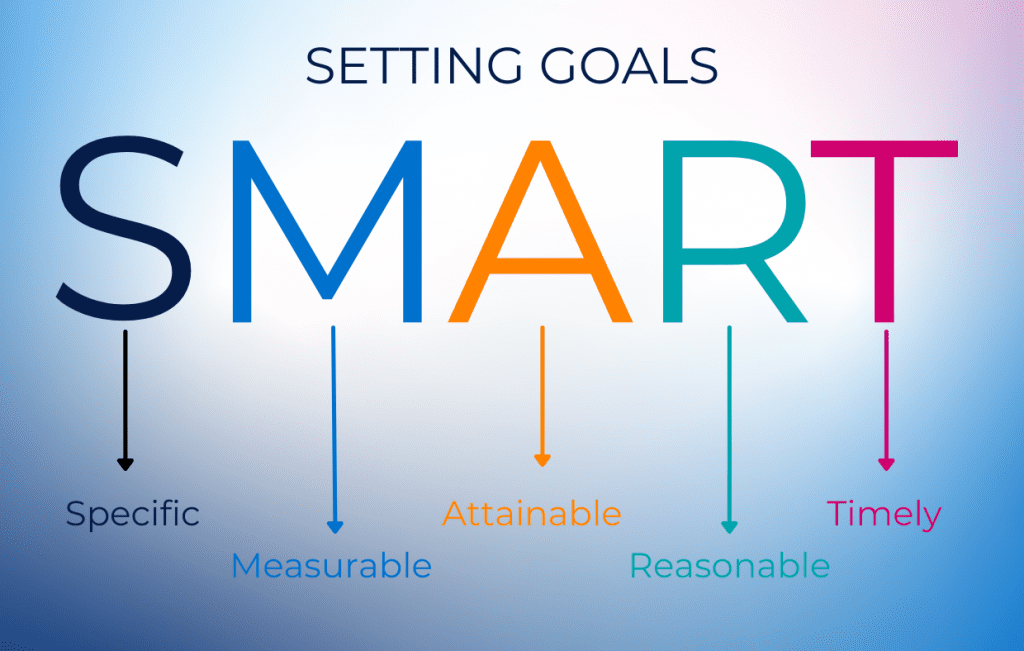Your event’s purpose, goals, and strategies, will be your guide to planning other aspects, such as identifying your target market, promoting, and executing your event. Whether you’re a full-time marketing expert, sales director, or event planner, We are is here to ensure your event planning is deliberate.
In this article, we’ll dive into what steps you need to take to create clarity around your event and increase your chances for success.
Understanding Company Goals
When we work with our clients, we take into consideration the client’s company goals and objectives so we can create effective messaging for their event so it resonates with their attendees. Company goals should be specific, financially focused, and provide a clear description of the event’s overall purpose.
By having a well-defined understanding of the company’s mission and goals for the year, we better understand how the event fits into the overall vision, helping create a tangible plan for success.
Identifying Your Events Purpose
Once we understand the company from a more holistic perspective, we focus our attention on the event and what purpose it serves in reaching the company’s overall goals. This conversation should help you understand the “why” behind the event, whether it be a product launch, meeting, conference, networking event, etc.
To understand your why, you should be able to clearly answer: What is your cause? What’s your belief?
When you understand and clearly define the “why” for hosting your event, it allows you to create a better event strategy. This strategy should also include details about your target audience or market and how you plan to reach it.
When we work with you on your event, our goal is to help you by becoming an extension of your team. Since we understand production and stay up to date on the latest technological advancements to create memorable event experiences, we can help create the perfect strategy to meet your goals.
Defining Event Goals
We support our clients by employing the SMART goals philosophy, which is an acronym that stands for Specific, Measurable, Attainable, Relevant, and Time-bound. The SMART framework keeps our clients accountable throughout the event planning and execution process. Defining event goals also allows our clients to avoid wasting money on things that don’t support company goals.
- Specific – The more clear and specific that you can make your event goals the more successful you will be as an event host. The questions you should ask yourself is:
- Who is the target audience?
- What am I trying to accomplish?
- Where will the goal be accomplished?
- When will the goal be accomplished?
- Why do I want to accomplish this goal?
- For example, if your event purpose is to promote a new product launch, your specific event goals should revolve around pre-sales, sales, and lead generation (ie email list).
- Measurable – After creating a specific event goal, it also needs to be measurable. The metric will, of course, depend on the type of event. Ask yourself things such as:
- How many registrations? How many leads?
- How do I know if I reached my goal?
- What is the indicator of the process towards my goal?
For example, if the specific goal is pre-sales and lead generation, a measurable metric could be hitting 500 new email addresses and 25 registrations. We highlight the importance of quantifiable goals and want our clients to hold us accountable to these event metrics.
- Attainable – Event managers need to be realistic with their goal-setting process and understand the importance of setting goals that will motivate your team. If your team feels challenged by the goals but doesn’t feel like they are out of reach, they will feel motivated. You can ask yourself and your team:
- Do I have the resources to achieve this goal?
- Have other events like mine achieved this goal?
- Relevant – Event goals are created to support and meet the goals of the company. When planning your event, be sure it aligns with the broader goals. Ask yourself why the result of the event is important to you and your company.
- Time-bound – Your event occurs on a specific date or over multiple dates, so it needs to be time-bound to host a successful event. If you’re promoting a new product and the goal is increasing lead generation through email subscribers & pre-orders at the event, then you need to have a specific time frame to track these metrics. For this example, your strategy may include automated emails, such as a pre and post-event survey leading up to the event.
Aligning Your Event Goals with Strategy
Below you will find several examples of strategies to help reach your event goals.
Sales & Revenue Generation
If your goals are sales & revenue-focused, consider product launches or trade shows, bootcamps or training seminars, fundraisers, or user conferences.
Lead Generation
If you’re in the B2B space, having your current and potential clients engage with your brand can grow client satisfaction and nurture your relationship with them. Consider events like annual conferences, trade shows, private dinners, experience seminars, company workshops, and more.
We’ve helped host B2B events from big venues to smaller private events. When hosting these types of events all the focus will be on your brand and it is important that you focus on understanding what would attract your current customers and what would incentivize new ones to attend your exclusive event.
Build brand awareness
Many brands host events simply to get their name out there to increase brand awareness. This is an opportunity for brands to show the world what they stand for and create an experience that resonates with attendees.
Event Education
If your goal is to educate your attendees, you can plan events that focus on thought leadership through keynote speakers, discussion panels, live Q&A sessions, and workshops.
Networking
Networking events bring us together, and in today’s digitally-focused world, we’ve recognized that event attendees are looking for in-person networking events. Still, they’re also looking for digital networking opportunities prior to and after your event. As an event host or planner, you’ll want to make sure you make it easier for people to interact by creating an environment and conversation starters in both your physical and digital event space.
How Vario can help
Without event goals, it will be hard to determine whether or not your event was successful. Take the time to determine your purpose, and use your company’s why to solidify SMART goals. We know planning and executing an event involves several moving pieces, and having a dedicated team to assist could be the solution for you. For more information, contact us at Vario today!







